We are thrilled to introduce you to BostInno’s 2018 50 on Fire.
Today, we’re officially announcing the 50 people and companies that are truly heating up Boston's ecosystem. Over the next few weeks, we’ll be spotlighting a number of these finalists on our site and in our newsletter, The Beat.
We invite you and your team, friends, family – and anyone that wants to network with Boston’s most inspiring, fastest-growing entrepreneurs, executives, startups and businesses – to join us November 8 at Artists For Humanity EpiCenter to celebrate this year’s winners as we honor the people, companies and ideas that continue to cement Boston as the global hub of and for innovation.
If you’ve been to 50 on Fire before, you’ll notice that we’re doing things a little differently this year. (Hey, we have to keep innovating ourselves, too!) We’ve previously announced 150 finalists prior to the event and revealed the 50 winners at the ceremony. However, by unveiling the 50 winners NOW and gathering everyone at the event, we allow for the community as a whole to celebrate those that are driving Boston forward.
But, of course, it wouldn’t be 50 on Fire without a big reveal. (It’s still an awards show!) At this year’s event, we’ll still have an action-packed video highlighting all of the 50, but we’ll also be unveiling the Inno Blazers, the seven people and/or companies (one from each category) that a panel of esteemed judges have selected. (Each 'Inno Blazer' will receive, yes, the ESTEEMED red blazer jacket).
And this year marks the SEVENTH annual 50 on Fire. That means that, since 2010, we’ve showcased 350 of Boston’s best and brightest. So, in the spirit of new additions, we’re also going to be unveiling BostInno’s inaugural ‘Alumni Blazers,’ seven former winners that are still as on fire as ever.
Now, on to the most important question - What makes a company or individual on fire? We’re looking at the people, companies and organizations that have had a banner year in Boston's innovation economy - whether that’s represented by a new funding round, a recent product launch, a milestone, a big hire, remarkable growth, a break-through, a successful pivot, an amazing rebrand - you name it. In 2018, we'll write nearly 700 stories and over 250 newsletters about local innovation. We know who's on fire.
Winners were sourced by both internal and external nominations and selected by the BostInno editorial team. Now, let’s get to the list…
Cybersecurity
Barkly: Endpoint protection platform Barkly, which bills itself as a complete antivirus replacement, nearly doubled the size of their customer base during the first half of 2018. This past summer, the company was listed by two Gartner reports as a sample vendor in the hardware-based security category.
Carbon Black: Waltham-based Carbon Black marked the first IPO of a Massachusetts tech company in 2018 with $152 million. With 534 employees in Mass., Carbon Black is the second-largest cybersecurity employer in the state, according to Boston Business Journal’s research. In September, the company opened an office in Boulder, Colorado—the company’s fifth location in the U.S. and ninth in the world.
BitSight Technologies: In June, cybersecurity ratings startup BitSight raised $60 million in a Series D round led by private equity giant Warburg Pincus, with participation from existing investors including Menlo Ventures, GGV Capital and Singtel Innov8. Earlier this year, the Boston-based company doubled down on office space.
ObserveIT: In July, ObserveIT closed its Series B round of funding at $33 million, a significant increase from the initial $16 million fundraising that the company announced in April. The company's software protects corporate data against reckless or malicious behavior by employees — also known as "insider threats.”
Iboss: In April, iboss made three additions to its senior leadership team. The following month, the company signed a lease that will double the size of its Downtown Crossing headquarters a year after the company relocated from San Diego, as CEO Paul Martini mentioned to BostInno earlier this year.
Veridium: Not bad for the company’s first external round. Veridium, a Quincy startup that wants to replace passwords with biometrics, closed a Series B funding round worth $16.5 million in June. The round was led by British entrepreneur and philanthropist Michael Spencer, who reportedly invested $14.2 million.
Education
edX: In September, Cambridge-based non-profit online learning platform edX received one of the highest honors in education as a winner of the Yidan Prize in Education Development (the prize ceremony will take place in December). The company was founded by Harvard University and MIT in 2012.
Anne Bosman (Senior Regional Director of General Assembly Boston): Anne Bosman, who joined the General Assembly Boston team in 2016, is now the senior regional director of General Assembly Boston. In her role, she combines her entrepreneurial spirit with strategic partnerships and new ideas for the local tech scene to help the GA community truly take root and thrive in the Greater Boston area. With her in command, more than 40,000 people have passed through GA Boston’s doors.
TechTogether: Founded a year ago by 13 students around Boston, the organization has since raised almost half a million and signed several research partnerships with organizations, including Boston University. Now, TechTogether (previously known as SheHacks) manages and supports a community of over 3,000 young women in technology.
FlatWorld: Publishing company FlatWorld, which is trying to rewrite the rules of the higher-ed textbook industry, has a revenue “in the solid millions” and it could one day go public, the company’s co-CEO Alastair Adam told BostInno in March. FlatWorld has now grown the Boston office to more than 30 people. Heading into the 2018/19 academic year, students at Bentley, Berklee, Boston College, Boston University, MIT, Emmanuel College, Fisher College, Northeastern, Tufts, UMass Boston, Wentworth Institute of Technology and other universities are using FlatWorld textbooks.
Mentor Collective: Formerly Shearwater, Mentor Collective seeks to provide all college students with “a transformative mentoring experience.” Earlier this year, it received $600,000 in Series Seed-1 funding to accelerate growth of its personalized student support platform (used at Northeastern University, Indiana University and Washington University in St. Louis.). Primary investor is Rethink Education.
Financial
Flywire: Flywire, which enables universities, hospitals and B2B companies better transact in foreign currencies, raised a $100 million Series D round led by Singapore-based Temasek Holdings and existing investors Bain Capital Ventures and F-Prime Capital in July. Earlier this year, the company announced the opening of its new expanded Asia-Pacific regional headquarters in Singapore.
LearnLux: Boston-based startup LearnLux, founded by Rebecca Liebman, in March won the PerfectPitch competition at the 2018 SXSW film festival, bringing home $400,000 in investments. Sound Ventures invested $200,000, which was double their initial offering, and Salesforce CEO Marc Benioff added on the additional $200,000. LearnLux helps Millennials learn to manage their personal finances.
Notarize: Founded in 2015 by entrepreneur and investor Pat Kinsel, Notarize - a Boston-based startup that connects customers with licensed remote notaries online - closed a $20 million Series B round earlier this year. The company expects to open new offices in states where notaries will be allowed by law to perform their services electronically.
KingsCrowd: One of the 10 fintech startups in this year’s summer cohort of the DCU FinTech Innovation Center, KingsCrowd wants to provide non-accredited investors with startup investment research and analytics. Part of the initial investment in KingsCrowd comes from John Fanning, founding chairman and CEO of Napster, who cold-called co-founder and CEO Chris Lustrino in February 2018 after having seen Lustrino’s fintech blog.
Nick Ducoff (Edmit): Founder and CEO of Edmit, Nick was previously Northeastern University’s Vice President for New Ventures. At Northeastern, Nick founded the Experiential Network and also launched the first university bootcamp, Level, which was recognized as an innovation by the U.S. Department of Education.
Hardware
Spyce: The MIT-born robotic kitchen opened its first fast casual restaurant in Boston’s Downtown Crossing in May and it’s ready to expand. At the end of the summer, Spyce announced it closed a $21 million Series A round (led by Collaborative Fund and Maveron, with additional participation from existing investor Khosla Ventures) to open new restaurants on the East Coast and further develop their robotic culinary platform. Funding for the round also came from chefs Thomas Keller, Jerome Bocuse and Gavin Kaysen, who joined Spyce’s culinary director Daniel Boulud.
Alert Innovation: Formed in 2013 as Alert Corporation, in 2018 North Billerica, Mass.-based Alert Innovation started working with Walmart to test a new, custom-designed robotic system that picks customers’ grocery orders. The system will start fulfill orders at Walmart’s supercenter in Salem, New Hampshire by the end of the year.
Accion Systems: Boston-based Accion Systems, which develops advanced electric propulsion systems for small satellites, is ready to launch its first satellites into space. It was founded in 2012 by MIT Ph.D student Natalya Bailey, whom the Boston Business Journal named a Woman to Watch in Science and Technology in 2017.
Analytical Space: Analytical Space, a satellite communications services startup, will remember 2018 as the year the company's first shoebox-sized satellite started orbiting the Earth. It was deployed from the International Space Station in July and is described as the first step in the company’s mission to build the "Cisco of space," referring to the California company that makes internet routers.
WaveSense: WaveSense, a Somerville startup that makes navigation systems, came out of stealth mode In August unveiling a product for self-driving vehicles — A patented military-proven ground-penetrating radar that helps self-driving vehicles stay in-lane. The MIT-born startup’s technology continually scans the subsurface soil layers, rocks and road bedding about 126 times per second and compares the scans to its onboard image database to determine the exact vehicle position in relation to the road. The startup raised $3 million in a seed round led by Rhapsody Venture Partners.
Ori: Just about six months after raising $6M in venture funding, MIT Media Lab spinout Ori - a Boston-based architectural robotics furniture company - started manufacturing the furniture systems. In Boston, partners include Skanska, which has apartments in the Seaport; Samuels and Associates, with buildings around Harvard Square; and Hines for its Marina Bay units.
Jason Walker: Jason Walker is the CEO and co-founder of Waypoint Robotics. Prior to founding Waypoint Robotics, Walker was the Vice President of Operations at Stanley Innovation, as well as co-founder and Director of Operations at CyPhy Works, a leading persistent drone company. Walker created the mantra of “Workforce First,” which means that empathy with the end user is the starting point for design and engineering decisions. That approach has led to the development of Vector - an easy to use, fully autonomous, industrial strength mobile robot, which can be set up and used by the current workforce on the job today.
Health and Wellness
Humon: In January, Humon unveiled the Humon Hex, a wearable that helps athletes understand the limits of their body and prescribes the perfect pace and workout intensities in real-time by measuring how muscles use oxygen. Humon Hex has been named a CES 2018 Innovation Awards Honoree.
Aavia: Aavia (previously aam) manufactures a device that reminds women to take the birth control pill. In 2018, the company started making the prototype available for purchase in waves to its early access list. After shipping its first batch of products, Aavia is working on the next version of the device and app solution. The startup is an alum of 2018 PULSE@MassChallenge Accelerator and 2018 MIT “delta v” summer cohort.
Newsha Ghaeli: Ghaeli is the co-founder of Biobot Analytics, an MIT and Greentown Labs startup that helps cities assess the opioid epidemic locally and evaluate the efficacy of intervention programs. Biobot was conceived while Ghaeli was a research associate at MIT. An architect by training,Ghaeli has collaborated on work with the United Nations Climate Change Summit, the U.S. Department of Energy, and the World Economic Forum’s Council on the Future of Cities.
Allurion Technologies: Allurion Technologies develops a medical device for weight loss that can be delivered and removed without surgery or endoscopy. Allurion’s flagship product, the Elipse Balloon, is the world’s first and only procedure less weight loss device. Backed by $27 million Series C financing in 2017, Allurion launched its pivotal US clinical trial for its weight loss device in February, completing enrollment in July and surpassing its 400-patient goal. They expect to receive top-line results in early 2019. Allurion kicked off the year by treating its 5,000th patient abroad and will close the year with more than 10,000 patients treated and 100,000 pounds lost.
Khaled Kteily (Legacy): Khaled Kteily is the founder and CEO of Legacy, the leading company focusing on male fertility. Headquartered in Geneva, Legacy works with the Harvard Innovation Lab in Cambridge. He’s worked at the World Economic Forum, where he was the youngest Global Leadership Fellow and focused on projects supporting entrepreneurship and innovation. Khaled is a graduate of the Harvard Kennedy School of Government, where he studied healthcare policy, received a full scholarship with the Center for Public Leadership, and was awarded highest distinction on his thesis.
Leisure
Liz Powers: Liz Powers is the co-founder and chief executive at ArtLifting, that connects socially conscious companies with talented artists impacted by homelessness or disabilities. While studying at Harvard, the company was part of the Harvard i-lab’s Venture Incubation Program. And now ArtLifting is based out of the Harvard Innovation Labs’ Launch Lab. After securing a grant post-graduation from Harvard, Liz spent a year establishing art groups in homeless shelters throughout the Boston area. In 2010, Liz was awarded the "Unsung Heroine Award" in the Massachusetts State House for founding art collectives and the LIFT Bike Project.
Opencity: Last year, Boston-based entrepreneur Nick Belsito launched chatbot application Opencity with the goal of streamlining business inquiries in the hospitality industry. Instead of having to check multiple platforms, users can see inquiries from Facebook, Google, their restaurant’s website and phone number all from one place.
TravelPirates: After setting sail for vacationers in Europe in 2011, Boston-based travel application TravelPirates now finds hotel rooms, travel packages, and even suggests experiences for users all around the globe. The TravelPirates team hunts for unique deals and curated experiences for vacationers. The parent application of the site, HolidayPirates, boasts 10 million downloads.
Hopper: Cambridge-based Airfare prediction app Hopper is going to take over the world, according to Frederic Lalonde, CEO and co-founder of the company. In 2016, Hopper raised $61 million in funding and now sells flights in almost 130 countries.
Bevi: Boston-based water dispenser maker Bevi recently added two robotics executives to its team, which aims to give users a plethora of drink options all from one water cooler. Bob Doucett, formerly of Amazon Robotics, is Bevi’s new COO, and Thomas Allen, formerly of Boston Dynamics, joined as the vice president of hardware engineering.
Lose It!: Lose It!, a Boston-based freemium app that helps users lose weight, recently took employees and their families on a company-expensed trip to Paris. Why’d they do it? “A big concept for us was that there were benefits to people from, sort of, changing location and see the world from a different perspective,” said CEO Charles Teague in an interview with BostInno. Employees attended team-building activities and group outings, and were also given time to make their own plans.
Maya Mutalik (HopeSews): Born out of the Babson Summer Venture Program, Hope Sews sells modern garments made out of Ghanaian fabrics and textiles and donates some of their proceeds to provide electric sewing machines to seamstresses in Ghana. Founder Maya Mutalik said she was inspired to create the company after a service trip to Anloga, Ghana.
Software
Armored Things: This startup provides safety and security systems to schools, stadiums, and the streets. Armored Things building a predictive incident and emergency response platform for the Internet of Things (IoT) to keep people safe in large shared spaces like schools, stadiums, and streets. In July 2018, the company completed a $5.5 million seed round of financing and has an exciting pilot program upcoming in the fall.
Rana el Kaliouby: Rana is Affectiva’s co-founder and CEO, an emotion measurement technology company that grew out of MIT's Media Lab. She invented Affectiva’s emotion recognition technology. In 2012, Kaliouby was recognized as MIT Technology Review’s 35 Innovators under 35 and Fortune's 40 Under 40. el Kaliouby earned her Bachelors and Master of Science degree from the American University in Cairo. Then she earned her Ph.D at Newnham College of the University of Cambridge.
Vyasa Analytics: Vyasa provides deep learning software & analytics for life sciences and healthcare organizations. It emerged from stealth mode in January 2018, and in July this year received a $1.8 million loan from MassDevelopment’s Emerging Technology Fund. Vyasa will focus on hiring Massachusetts’ talent and to build a local infrastructure.
Cogito: This Downtown-Boston startup enhances the emotional intelligence of phone professionals by applying behavioral science through artificial intelligence and machine learning. Its software analyzes human behavior through voice and delivers in-the-moment guidance to phone-based sales and service professionals helping them improve their performance and build deeper emotional connections with customers. In February 2016, Cogito paired with Mass General as a part of MGH’s MoodNetwork, a nationwide network for bipolar disorder and depression sufferers. It raised its Series C this summer led by Goldman Sachs.
Cuseum: Cuseum develops products such as mobile applications, digital membership cards, and an augmented reality platform for museums, public attractions, and cultural nonprofits. The startup was Selected by Amazon as partner for mobile engagement with first digital project for the White House. It Launched AR project “Hacking the Heist” that went viral and caught the attention of the internal press, including Wired, Fast Company, Engadget, and 100+ news publications and was named one of the world's most innovative startups in travel and tourism by WTFL* Received a patent for cutting-edge content delivery approach
Supporters
Emily Reichert: Reichert is the CEO of Greentown Labs, touted as the largest cleantech incubator in the U.S. Reichert sets Greentown Labs’ strategic direction, focusing on increasing the organization’s impact on clean and energy efficient technology commercialization through entrepreneurship. Prior to Greentown Labs, Reichert was the Director of Business Operations at the Warner Babcock Institute for Green Chemistry. She holds a PhD in physical chemistry and earned her MBA from MIT.
Harvard iLabs: Founded in 2011, the Harvard iLabs was an initiative set up to to promote team-based and entrepreneurial activities among Harvard students, faculty, entrepreneurs, and members of the Allston and Greater Boston community. The i-Lab's stated aim is to promote entrepreneurship and innovation across the University, bringing together many cross-curricular interests, including students from all its schools like Harvard Business School, Harvard College, Harvard Faculty of Arts and Sciences, Harvard Extension School and others. Between September 2017 and August 2018, the Harvard Innovation Labs held 2171 events. This represented an 80% YOY increase from September 2016 through August 2017 (1208 events held). Between September 2017 and August 2018, the Harvard Innovation Labs incubated more than 260 startups across the i-lab, Launch Lab, and Life Lab.
Roxbury Innovation Center: Roxbury Innovation Center (RIC) was created through a public-private partnership with the City of Boston and Venture Café Foundation in 2015 with a mission is to support local economic development, in Roxbury, by empowering and guiding innovation and entrepreneurship, as viable career options. In 2017, Comcast announced that it is partnering with Roxbury Innovation Center (RIC) to help foster the organization’s workforce readiness efforts, specifically as it relates to technology program and product offerings. RIC’s other partners include Microsoft, Google and Massachusetts Tech Collaborative.
Venture Cafe: The Venture Café Foundation is a non-profit whose goal is to enhance and accelerate innovation in the Greater Boston region. The foundation does that by offering meeting space, programming, and connections that build relationships between entrepreneurs, investors, and innovators. It runs several innovation meetings spaces including Roxbury Innovation Center, District Hall and Venture Cafe in Kendall. The Venture Cafe Kendall program is touted to be longest running and largest weekly gathering of the innovation community and organizes several industry-focused on biotech, fintech, robotics, IoT and edtech.
Bobbie Carlton: Carlton is the founder of Innovation Women, Innovation Nights and Carlton PR & Marketing. Innovation Women is an online database of female speakers to create more gender-balanced panels at events. Carlton is also the founder of Mass Innovation Nights, a product-launch showcase that allows companies to exhibit Massachusetts-based products. Bobbie and the Innovation Nights community have helped to launch more than 1,200 new products which have collectively raised more than $2 billion in funding.
Social Impact
Wafaa Arbash: Arbash is the co-founder and CEO of WorkAround, an impact sourcing provider helping companies get more done for less while giving jobs to refugees. WorkAround is working around the barriers to employment for refugees by providing them with an online microwork platform that helps AI and machine learning companies with human intelligence tasks. Arbaash started WorkAround while working on her master’s thesis in Sustainable International Development and Conflict Resolution from Brandeis University. Prior to WorkAround, Wafaa served as a program manager for Startup Institute and refugee education in Jordan. She worked in Syria for more than five years in social development programs where she spearheaded several projects to empower local citizens, increase their leadership skills.
Resilient Coders: A 50 on Fire alumnus, Resilient Coders is on a mission to spread code literacy to young people from traditionally underserved communities. Resilient Coders offers several bootcamps and courses full-time, 14-week Javascript coding bootcamp In addition to technical skills, industry professionals also teach students communication techniques, speaking tips, and best practices for accountability and time management. Participants are also expected to procure, service, and invoice their own freelance clients to learn what it takes to become self-employed. The organization has won several awards in the past including MassTLC Distinguished Leader Award and been a MassChallenge Finalist.
Upstream: Upstream is a public benefit corporation and a Greentown Labs member with the mission “to create economic forces that drive environmental good.” Its platform creates customizable and scalable machine learning platform that utilizes remotely sensed data to empower public, corporate and non-profit sector actors to make more informed water use, management and conservation decisions. The platfrom analyzes 100,000s of satellite imagery tiles on a weekly basis.
Starry: Starry Internet is a fixed wireless broadband Internet service provider. Starry offers its customers a $50 per month for 200 mbps download/upload speeds. Starry has also launched its service in Los Angeles and Washington, DC and will begin delivering its service in New York City this fall. Its program, Starry Connect will roll out in affordable housing developments managed by Related Companies, a developer that, in addition to a range of market-rate properties, owns around 45,000 units of affordable housing across the country.
Resonant Energy: Resonant Energy is a startup that brings solar power access to nonprofits and lower-income single-family homes. What started with a community project to solar power a church in Dorchester five years ago is now a company that’s eight-member strong and looking onto a million dollar funding round next year. The company brought solar power to churches in Dorchester, Medford, and Arlington, Smith College in Northampton, Epiphany School, which is an independent school for children of economically disadvantaged families and Commonwealth Kitchen, a nonprofit community kitchen based in Quincy. The company has also serviced close to 40 projects in the last six months in Massachusetts and Long Island City in New York.
Congratulations to the winners!
With inputs from BostInno's Shelby Grebbin








